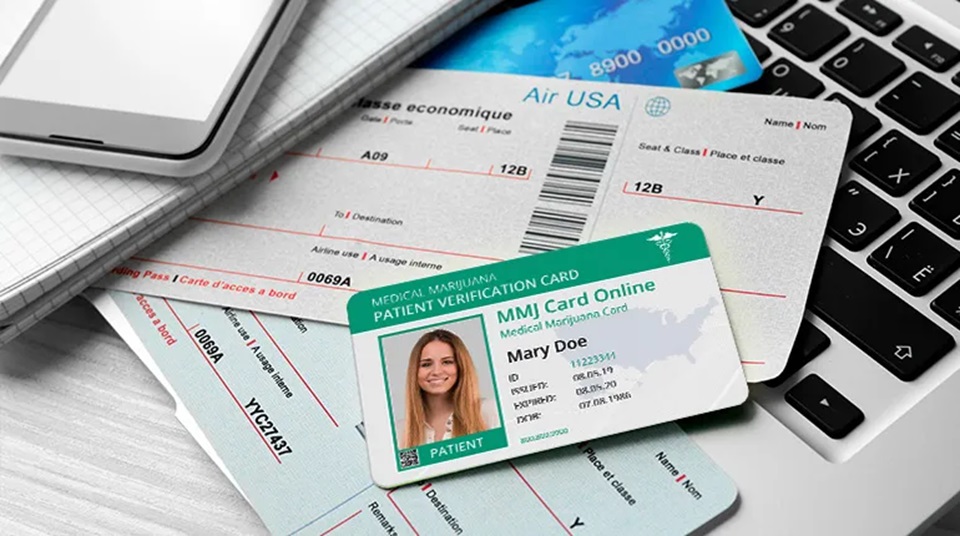In the U.S., medical marijuana is currently legal in 38 states, allowing people with certain medical conditions to access cannabis. To qualify as an MMJ patient, they must suffer from one of the qualifying conditions stipulated by the state, and a doctor must confirm their condition and approve marijuana use.
In most states, the steps for obtaining a medical marijuana card are fairly straightforward as long as you’re eligible. Once you receive your MMJ, you can visit any licensed medical cannabis dispensaries in your state and purchase marijuana products.
If you’re wondering, “Can I use my medical marijuana card in another state,” it depends. Some states have reciprocity programs that allow MMJ patients from certain states to purchase, use, or possess medical cannabis in another state.
However, just because you meet the criteria to get an MMJ card, doesn’t mean you’re entitled to one. Applications are subject to careful review by the state MMJ program, and it’s possible to get turned down for a medical marijuana card.
Table of Contents
Why Can You Get Turned Down For A Medical Marijuana Card?
There are several steps involved in obtaining a medical marijuana card. Although the process may differ slightly from state to state, for the most part, it’s very similar. Here is a brief overview.
- Check your state’s list of qualifying conditions to see if you’re eligible
- Book an appointment with a doctor to discuss your condition and using marijuana as treatment
- Consult with the doctor who will evaluate you and recommend the use of MMJ if they approve
- Register with your state’s MMJ program and submit an online application
- Pay the application fee and wait for approval
An error or hiccup during these steps could result in you being turned down for a medical marijuana card. Here are the most common reasons you may be denied.
Your Doctor Doesn’t Approve The Use Of MMJ
The most likely reason to get turned down for a medical marijuana card is because your doctor won’t give you a recommendation for the MMJ program. After checking that you’re eligible, scheduling a doctor’s appointment is the first step in applying for an MMJ card.
Every state sets its own list of qualifying conditions. The most common include chronic pain, post-traumatic stress disorder (PTSD), anxiety, and depression. However, you must check your specific state’s qualifying conditions to check eligibility. If you think you qualify, you will need to visit a doctor to evaluate you and recommend using MMJ. You can’t be approved without a doctor’s recommendation.
Typically, the doctor will require previous health records from the past 1 – 3 years and conduct a thorough evaluation to check if marijuana could benefit you. If they don’t find you to suffer from a qualifying condition or aren’t confident that marijuana will be beneficial or safe to use, they won’t approve you for MMJ.
Although it’s very frustrating, listening to your doctor is important since their primary job is to protect your health and safety. There are several disqualifying conditions, such as schizophrenia, severe depression, previous suicide attempts, and substance abuse, that can make the use of marijuana dangerous.
Error On Your Application
If you did not fill out your application correctly or there is a clerical error, you might not be approved. This could entail not including a passport photo in your application, submitting an expired or not government-issued proof of identification, and not providing proof of veteran status or medical support if applicable.
Also, make sure the doctor submits the MMJ recommendation and supporting medical records on your behalf. In most cases, they do, but check that submitting these documents is not your responsibility.
It’s important to provide all the requested information and supporting documentation to avoid being denied an MMJ card.
Violent Criminal Record
Fortunately, a misdemeanor drug possession charge is unlikely to affect your chance of getting an MMJ card. However, a history of violent crime could pose a big problem during the application process.
If you’ve been convicted of a gun-related or other violent crime, especially if drug-related or have charges like drug manufacturing and distribution, you might not be approved for an MMJ card.
Age Requirements
Depending on the state, applicants must be between the ages of 18 and 21 to be eligible for an MMJ card. If you are younger, you will need a parent or legal guardian to apply for the medical marijuana program on your behalf.
Final Thoughts
You may think that because you suffer from a “qualifying medical condition,” you are automatically guaranteed an MMJ card. However, this isn’t the case. Having a medical marijuana card is more like a privilege than a right, and the approval process is at the state’s discretion.
There are several reasons you may get turned down for a medical marijuana card, the most likely being that a doctor doesn’t approve you as an MMJ patient. Other possible reasons include an error on your application, a violent criminal record, and age requirements. The good news is that you can often amend and resubmit your application, especially if you were denied for a clerical error.



